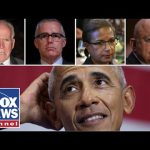In a recent broadcast, conservative commentators gathered to discuss a rather unusual meeting between President Trump and Jerome Powell, the chairman of the Federal Reserve. What caught viewers’ eyes wasn’t just the high-profile nature of the meeting but the seemingly awkward dynamic that unfolded, reminiscent of a vintage Trump moment. The conversation reflected the age-old dance between politics and economics, where the stakes are high and opinions run deep.
As the dialogue unfolded, the commentators drew amusing comparisons to old cartoons, likening the tension in the room to a scene with a character in a tank wearing a helmet. This analogy struck a chord, especially for those who remember the antics of old TV shows. While there was laughter, the underlying seriousness of the discussion didn’t go unnoticed. The president and the Fed chair were squaring off in what felt less like a cordial chat and more like a high-stakes negotiation.
One key point of contention was the performance of Jerome Powell. The commentators pounced on the notion that Powell has indeed stumbled in his role. The arguments centered around inflation, with assertions that his management of the economy has sometimes been less than stellar. Critics noted that Powell has allowed the printing of excessive money, contributing to rising inflation rates that hit working-class Americans hard. Instead of sticking to the Fed’s mandate of maintaining low inflation and stable employment, it seemed he had veered into uncharted territory, dabbling in issues like diversity, equity, and inclusion, which some felt were outside the central bank’s responsibilities.
The scene was further complicated by President Trump’s background as a builder and dealmaker. This unique perspective positioned him as someone who might have insights into how economic agreements should be made. The commentators discussed whether Trump was using this meeting to underscore the importance of fiscal responsibility and competent management at the Fed. After all, if Powell couldn’t handle a budget effectively, could he be trusted to steer the national economy? This question loomed large over the conversation.
While the air was charged with critique, the commentators also expressed a certain caution about “wacking” at the Fed. It was suggested that undermining this institution could create unwanted volatility in financial markets. As one pointed out, regardless of the criticisms, the independence of the Fed has historically provided a cushion for investors, allowing trillions of dollars to flow into the U.S. economy. It’s a delicate balance, where even well-meaning efforts can lead to instability if not handled with care.
In summary, the meeting between President Trump and Jerome Powell sparked a lively debate about economics, leadership, and accountability. With amusing comparisons and serious undertones, the commentators illustrated the complexities involved in overseeing the nation’s economic health. While humor often lightened the mood, the larger implications of fiscal strategy loomed large. In the world of finance, as in life, understanding the power dynamics and responsibilities is crucial—especially when it involves the delicate machinery that makes the economy tick.




